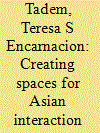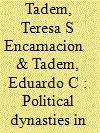| Srl | Item |
| 1 |
ID:
112144


|
|
|
|
|
| Publication |
2012.
|
| Summary/Abstract |
This paper discusses the political opportunity structures which facilitated the creation of sites of interaction and protest against the Asian Development Bank during the Bank's Annual General Meeting in Chiang Mai, Thailand, in 2000. The factors which facilitated the coming together of Thai social movements and their regional and international counterparts are mainly their shared critique of the neo-liberal paradigm and its adverse effects on their respective countries. The strategies they used to highlight these effects enhanced their sites of engagement and confrontation with the Bank and included dialogue with Bank officials, demonstrations, and the use of the media to highlight their concerns. Importance was also placed on the manner in which they were able to mobilize resources for the anti-Asian Development Bank campaigns and the process by which they framed their issues to gain the sympathy and support of the public. The 1997 Asian financial crisis, which highlighted the shortcomings of the Bank's development paradigm, as well as the ongoing democratization process in Thailand during that period, provided the impetus in fostering the anti-globalization alliances of local and transnational social movements in a common venue.
|
|
|
|
|
|
|
|
|
|
|
|
|
|
|
|
| 2 |
ID:
148548


|
|
|
|
|
| Summary/Abstract |
The results of the 2013 Philippine mid-term elections highlighted the dominance of political dynasties in the country. With all 80 provinces littered with political families, 74 percent of the elected members of the House of Representatives came from such dynastic groups. Despite overwhelming recognition that political dynasties breed patronage politics and corruption, no substantial steps have been undertaken to address this issue. This article examines the general nature of Philippine political dynasties, the reasons for their continuing existence and their adverse impact on the country. This problem emanates basically from three factors: (1) the political and socio-economic foundations upon which political dynasties are built; 2) the inability to effectively implement Philippine constitutional provisions by enacting an enabling law; and 3) the weakness of potential countervailing forces that would challenge political dynasties.
|
|
|
|
|
|
|
|
|
|
|
|
|
|
|
|